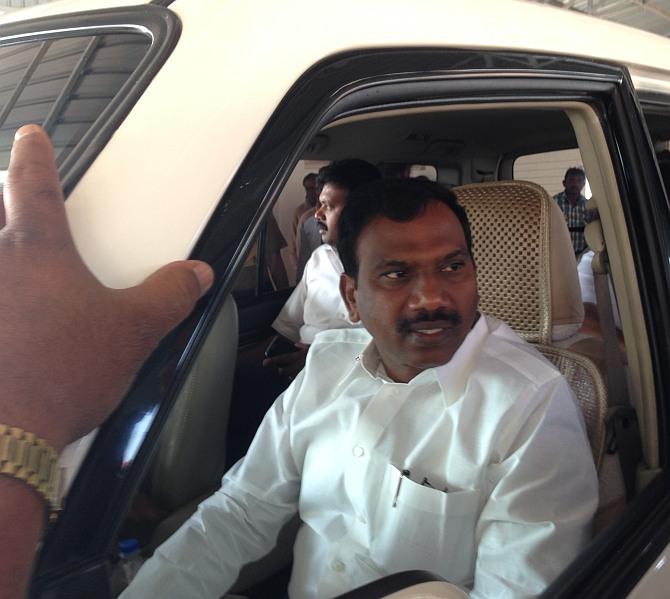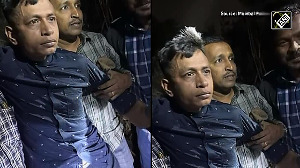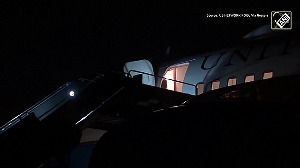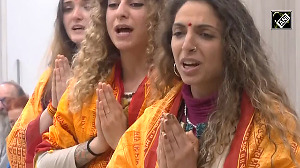The Delhi high court on Monday dismissed a plea by former telecom minister A Raja and others contending that the Central Bureau of Investigation's appeal against their acquittal in the 2G spectrum scam case has become infructuous with the amendment in the anti-corruption law.

The high court said an amendment in the act does not apply to the offences already taken place.
Justice Brijesh Sethi held that the 2018 amendment to the Prevention of Corruption Act relating to Section 13 (1)(d) would not come to the rescue of the acquitted accused in this appeal.
"Amended Act does not apply to offences that have already taken place. There was no intention to obliterate the earlier law. There is no impediment in hearing the appeals. The applications are dismissed," the judge said, while pronouncing separate verdicts on various applications and petitions.
Justice Sethi is going to demit the office on November 30 and due to paucity of time, he released the 2G case appeals from his board stating that the pleas will be listed before another bench on December 1.
Raja had told the high court that the CBI's appeal against the acquittals in the 2G case has become infructuous with the coming of the new anti-corruption law.
His counsel had told the court that the graft charges levelled against him and others in the case have been omitted in the new Prevention of Corruption Act of 2018 and therefore, prosecution in the instant matter cannot go on.
Apart from Raja, his then private secretary R K Chandolia, former telecom secretary Siddharth Behura and Bollywood film producer Karim Morani had also raised the issue in separate applications filed by them.
The CBI had contended that the applications were not sustainable as this specific issue had been raised in the replies filed in response to the agency's appeal.
Section 13(1)(d) of the PC Act was repealed in 2018 when the law was amended by Parliament.
Section 13(1)(d) of the Act spoke about criminal misconduct by a public servant if he obtained for himself or for any other person any valuable thing or pecuniary advantage by corrupt or illegal means; or by abusing his position as a public servant, or while holding office as a public servant, obtained for any person any valuable thing or pecuniary advantage without any public interest.
The CBI and the Enforcement Directorate have challenged the acquittal of all the individuals and companies in the 2G scam corruption and money laundering cases by the trial court.
The CBI had also filed an appeal challenging the acquittal of Essar Group promoters Ravi Kant Ruia and Anshuman Ruia and six others in a separate case arising out of the 2G scam probe.
A special court on December 21, 2017 had acquitted Raja, DMK MP Kanimozhi and others in CBI and ED cases related to the scam. It had acquitted 17 others, including DMK supremo M Karunanidhi's wife Dayalu Ammal, Vinod Goenka, Asif Balwa, film producer Karim Morani, P Amirtham and Sharad Kumar, director of Kalaignar TV in the ED case.
On the same day, the trial court had also acquitted Behura, Chandolia, Unitech Ltd MD Sanjay Chandra and three top executives of Reliance Anil Dhirubhai Ambani Group -- Gautam Doshi, Surendra Pipara and Hari Nair -- in the CBI's 2G case.
Swan Telecom promoters Shahid Usman Balwa and Vinod Goenka and directors of Kusegaon Fruits and Vegetables Pvt Ltd Asif Balwa and Rajiv Agarwal were also acquitted in the CBI case.
On March 19, 2018, the ED had approached the high court challenging the special court's order acquitting all the accused.
A day later, the CBI too had challenged in the high court the acquittal of the accused in the case.
The ED, in its chargesheet, had alleged that Rs 200 crore was paid by STPL promoters to DMK-run Kalaignar TV.
The CBI had alleged that there was a loss of Rs 30,984 crore to the exchequer in allocation of licences for the 2G spectrum which were scrapped by the top court on February 2, 2012.
Special Judge O P Saini (now retired), however, held that the prosecution had "miserably failed" to prove the charges. The special court, which was set up on March 14, 2011 for hearing 2G cases exclusively, had also acquitted Ruias and others in a separate case arising out of the 2G scam probe.
In the CBI case, Raja, Kanimozhi and 15 others were tried under provisions of the IPC and the Prevention of Corruption Act, 2013 dealing with offences of criminal conspiracy, cheating, forgery, abusing official position, criminal misconduct by public servant and taking bribe.











 © 2025
© 2025